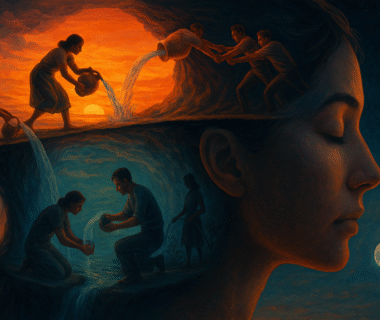Let’s be real. If you are here, you are probably here by accident or maybe a friend sent this to you and said IF YOU DON’T SHARE THIS YOU WILL DIE…
Uh, you’re going to die regardless, but that’s not the point.
What is the point?
The point is… CONGRATULATIONS! You are a rare person!
Now give yourself a round of applause and share it again. 😇
Jokes aside and in complete seriousness…
Statistically speaking, you are not likely to be reading this blog post.
No.
You are infinitely more likely to be watching this instead.
Yes, that’s right, that’s what I think of you – I think that you would more likely than not just be casually scrolling TikTok, YouTube Shorts, or any dozen Instagram Reels rather than reading what this delulu guy is saying.
Yet, you are here. You are reading. Congratulations!
What does this mean?
This means that however many minutes you spend reading this blog post, you will never get those minutes back.
Wow, what a shame. These are precious minutes that you could have spent binge-watching Skibidi Toilet 15 more times, before going on TikTok and doom scrolling for another 3 hours. Before realizing that your economics exam is coming up in 2 weeks, repeating the same evening over and over again, and finally there are 10 minutes left and you decide that you must praise Skibidi Toilet Alpha Rizzler for the gyatt and try to sigma your way into success.
Jokes aside, time is limited.
Your attention is limited, and since this is an economics blog, you’ll be happy to know that the attention economy is a real thing, and that we could cite as proof for that statement the fact that there is literally a Wikipedia article titled “Attention Economy”.
We could quote Herbert Simon here and say that a wealth of information creates a poverty of attention or talk about how, when somebody is distracted from a task, it takes an average of 23 minutes to switch back into the flow.
Uh, we did, but you can understand that much more clearly just through your common sense, and I could clearly and immediately say that it is not your fault, and it is not the fault of other people reading this either.
After all, any given moment on this internet with its multiple terabytes of data, you have trillions of possible choices for things you could spend your time on – at any given moment, there are hundreds if not thousands of different people competing for your attention, doing so in extremely sophisticated ways, some by playing on your emotions and others by algorithms that decide what you’re going to see without a click, a share, a touch of a button, or an enter of a URL for profit motive.
In English?
People and platforms make more money when you spend more time watching them and not other people and when you sacrifice your time to watch them, and they will develop their content and use platforms to engage and maximize engagement — the most logical and effective manifestation of which is what we now call brainrot.
Think about it. Short videos + high stimulation = extreme engagement = high shareability = more money for both the creator and the platform (YouTube, Instagram, or whatever poison you prefer).
What does this mean?
This means that by the design of the platforms of the internet, there is an incentive to make more content like this, and there is a profit motive of people to compete for your attention.
Not only that – there is a profit motive for people and the platforms to cultivate it and make it more effective through surveillance capitalism, watching your behaviors and your preferences, repeating this over time to optimize for your attention — not maximize your attention just in the moment, but to optimize for your retention over your entire lifetime with these short and high engagement videos over time?
Is it any wonder that there has been a sharp drop in our statistical average generational attention span (12 seconds in 2000 to 8 seconds in 2013, leading us to now underperform goldfish (9 seconds))…
…And therefore, that it is terribly unlikely that you would end up reading this blog post and reading it until the end?
I’m not immediately blaming you for that, and I’m certainly not about to start yapping, as you say, about things that the younger generation did or did not do, characterize you as strawberries or any number of exciting things that insult you or mock you, but I will say this.
Every second that we spend on earth is one second that is gone. Whether in sleep, whether in eating, whether in talking to a friend, a family member, or anyone and anything else, The time that you spend on any given piece of content or otherwise is time that will never return to you.
For people who have worked part-time jobs, I suppose this is intuitive, since you are paid money for every hour that you spend at your job – Which in turn answers the question:
What is the economic value of your time?
For some of you it is 10 ringgit per hour, for others $10, for some others $1000, and for a smaller few, tens of thousands.
But of course, value isn’t just measured in dollars and cents because it can also be less tangible than that.
You might ask the questions, for example…
Did the 5 minutes that I spent watching these videos help me have a higher chance of getting a specific job?
Did the time that I spent studying this subject increase my chances of creating a new and exciting work?
Did the 10 minutes I spent reading this help increase my ability to interact with the world in a slightly better, more efficient, or elegant way?
Did the 10 seconds it took to share this increase the sigma skibidi ohio gyatt alpha of my rizzler?
We don’t always know the answer to these questions.
After all, brainrot is pretty interesting, not gonna lie…
But here’s a fact for you.
Your time is limited, and how you spend it will shape your life, the way you think and the way you internalize the world.
I’m not saying that reading this piece was the best ever way that you could have spent your time, but if there is a takeaway from this post, then let it be this:
Your attention is a valuable and finite currency.
What you exchange it for matters, so you might as well let it be for something good.
Of course, in a default state, I’m sure that you will do well.
Algorithms are pretty good at deciding what’s interesting for you after all, and they are slated to evolve over time… So will it really be that bad?
Well, who am I to say? Either way, the fact that you’re here says something, and the fact that you read it till the end, say something else as well. Share this to your most Skibidi Ohio Rizzler friend and slay the delulu as the solulu.
What do you think about brainrot? Let me know your thoughts down in the comments!
All right, that’s all I’ll say about that and bye!
Yours,
Sepupu.



